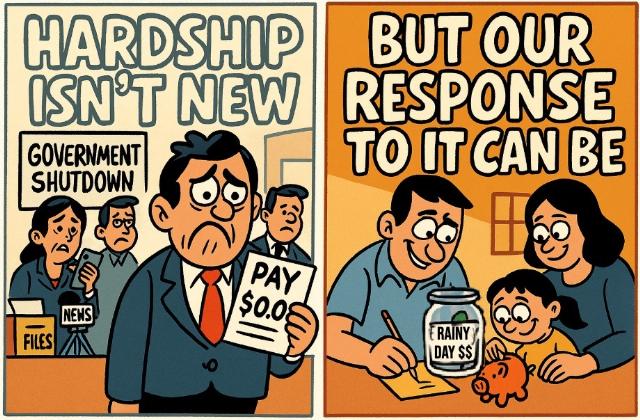Hardship isn’t new—but our response to it is
Every time the federal government shuts down, the headlines follow a predictable script: “Federal workers suffer.” We hear stories of long hours without pay, families unable to afford groceries, mortgages teetering on default, and lines at food banks stretching longer than ever. These stories are real, and the hardship is genuine. But they are not unique. Nor are they new.

Image created using AI.
Millions of Americans outside the federal workforce experience similar or worse conditions every year—without the guarantee of backpay, without job security, and without the media’s sympathetic spotlight. Private-sector workers get laid off, hours are cut, businesses close, and entire industries shift. And when that happens, there is no promise of retroactive compensation. The suffering is permanent, not postponed.
So why does the narrative surrounding federal employees feel so disproportionate? Why does their temporary hardship dominate the national conversation while the chronic instability of millions goes largely ignored?
The answer lies not just in media bias, but in a deeper cultural drift—a shift away from personal responsibility and toward grievance-based storytelling. We’ve become a society that highlights suffering more than preparedness, emotion more than agency. And nowhere is this more evident than in our collective financial fragility.
Let’s be clear: the real crisis isn’t the shutdown. It’s that so many Americans—federal employees included—cannot survive even a few weeks without a paycheck. That’s not systemic oppression. That’s poor planning. And it’s time we said so.
There was a time when financial literacy was a civic norm. We were taught to save six months’ worth of expenses in an emergency fund. Not because we expected disaster, but because we respected its inevitability. Layoffs happen. Illness strikes. Markets crash. Governments stall. Life isn’t fair—but it is predictable. And preparedness was once a mark of maturity, not privilege.
Today, that ethic has eroded. Many middle-class and even upper-middle-class Americans live paycheck to paycheck—not from necessity, but from misaligned priorities. Luxury spending eclipses savings. Vacations, gadgets, and lifestyle upgrades take precedence over emergency reserves. The problem isn’t income—it’s discipline.
This isn’t a condemnation. It’s a wake-up call.
If you’re a federal employee caught in the crosshairs of a shutdown, and you find yourself unable to make ends meet, let this moment teach you something deeper than frustration. Let it teach you resilience. Let it teach you stewardship. Let it teach you that your financial well-being is your responsibility—and no one else’s.
Because here’s the truth: you will get paid. The shutdown will end. Back pay will come. But the hardship you feel now is not about lost income—it’s about lost preparation. And that’s something you can change.
Start today. Build your emergency fund. Prioritize savings over indulgence. Reclaim the ethic of readiness because the next crisis is already forming. And when it comes, you’ll either be a victim of circumstance or a steward of foresight.
This isn’t just about federal workers. It’s about all of us. It’s about restoring a culture that values agency over grievance, preparation over panic, and responsibility over entitlement. It’s about teaching our children that life will test them—and that the best defense is not outrage, but readiness.
The media may continue to highlight suffering. That’s their business. But our business—our duty—is to respond with clarity, not complaint. To say: “Yes, this is hard. But I will be ready next time.”
Because hardship isn’t new. But our response to it can be.
So to those who feel the sting of this moment:
Own it. Accept it. Move on.
And next time, be ready.